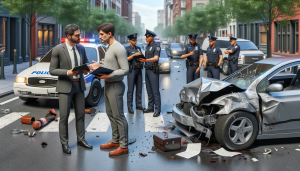Legal Resources for Car and Truck Accident: Navigating the Road to Justice
Being involved in a car or truck accident can be a life-altering experience, both physically and emotionally. On top of the trauma of the accident itself, victims often find themselves overwhelmed with medical bills, insurance claims, and legal paperwork. Whether it's a minor fender-bender or a catastrophic collision, having access to the right legal resources is essential to ensure that justice is served and that you receive the compensation you deserve. Understanding the legal steps, available resources, and expert advice is crucial in navigating the often complex and overwhelming journey to justice after an accident.


The Importance of Legal Representation
Car and truck accidents can become legally complicated very quickly, especially when determining fault, negotiating with insurance companies, and pursuing compensation for damages. Having a skilled attorney by your side is invaluable. A lawyer specializing in car and truck accident cases will help you:- Understand Your Legal Rights: Many accident victims are unaware of their full legal rights, including their right to compensation for medical expenses, lost wages, and pain and suffering. An attorney will explain these rights and how they apply to your case.
- Navigate Complex Legal Procedures: Filing a claim can involve mountains of paperwork, strict deadlines, and intricate legal processes. A legal expert will ensure that everything is completed correctly, preventing you from making costly mistakes.
- Negotiate with Insurance Companies: Insurance companies are notorious for minimizing payouts. An attorney with experience in accident cases will negotiate on your behalf, ensuring you receive the maximum compensation for your injuries and losses.
- Represent You in Court: If your case proceeds to litigation, having legal representation becomes even more critical. Your attorney will present evidence, argue your case, and advocate for your best interests in court.

Common Causes of Car and Truck Accidents
Understanding the common causes of car and truck accidents is essential for determining liability and building a strong legal case. Some of the most frequent causes include:Distracted Driving
The rise of smartphones has made distracted driving one of the leading causes of accidents. Texting, talking on the phone, adjusting navigation systems, and even eating or drinking can divert a driver’s attention long enough to cause a crash. In legal cases, proving distracted driving often involves obtaining cell phone records, eyewitness testimony, and surveillance footage.Drunk Driving
Alcohol impairs a driver’s ability to make sound judgments and react to road conditions. Drunk drivers pose a severe hazard to everyone on the road. Victims of drunk driving accidents often pursue civil lawsuits in addition to the criminal charges faced by the intoxicated driver. In such cases, the victim may seek punitive damages as well as compensation for their injuries.Fatigue and Overworking (for Truck Drivers)
Truck drivers are often under immense pressure to meet tight delivery deadlines, leading to fatigue. Drowsy driving is a significant cause of truck accidents, and federal regulations limit the number of hours a trucker can be on the road. In accidents involving truck drivers, it’s essential to investigate whether hours-of-service violations occurred, as this can affect liability.Speeding and Reckless Driving
Speeding is another leading cause of accidents, reducing a driver’s ability to react to sudden changes in traffic conditions. In truck accidents, the sheer size and weight of the vehicle make speeding especially dangerous, as it increases stopping distances and the force of impact.Types of Compensation in Car and Truck Accident Cases
Victims of car and truck accidents are entitled to seek compensation for various damages. The amount and type of compensation depend on the specific circumstances of the accident, but common types of compensation include:Medical Expenses
Medical bills can accumulate quickly after an accident. Compensation typically covers a wide range of medical expenses, including emergency room visits, hospital stays, surgeries, physical therapy, prescription medications, and long-term rehabilitation. In some cases, compensation may also cover future medical costs if the injuries require ongoing care.Lost Wages
Severe accidents can force victims to take time off work to recover. Compensation for lost wages helps cover the financial gap caused by the inability to work. If the injuries result in permanent disability, victims may also be entitled to compensation for lost earning potential, ensuring their future financial stability.Property Damage
Car accidents often result in significant property damage, from vehicle repairs to damage to personal belongings inside the car. Compensation for property damage ensures that victims can repair or replace their vehicles and any other damaged items without incurring out-of-pocket expenses.Pain and Suffering
Physical injuries often come with emotional trauma, including anxiety, depression, and post-traumatic stress disorder (PTSD). Victims can seek compensation for pain and suffering, which addresses the emotional and psychological toll the accident has taken on their lives.Punitive Damages
In cases where the defendant’s behavior was especially reckless or negligent (e.g., drunk driving), courts may award punitive damages. These are designed to punish the wrongdoer and deter similar behavior in the future.Understanding Liability in Car and Truck Accidents
Establishing liability is one of the most critical aspects of any car or truck accident case. Liability determines who is legally responsible for the damages and who will be required to pay compensation.
Determining Fault in a Car Accident
Fault is usually determined through a combination of police reports, witness statements, and physical evidence from the scene. In some cases, accident reconstruction experts may be called upon to analyze the crash and provide an expert opinion on what caused the collision and who was at fault.Unique Liability Challenges in Truck Accidents
Truck accidents often present unique liability challenges. Unlike car accidents, where fault typically rests with the driver, truck accidents may involve multiple parties. For example, the trucking company may share liability if they pushed the driver to violate federal regulations, while the vehicle manufacturer or a third-party maintenance company may be held responsible if a mechanical failure contributed to the crash. Investigating these additional layers of liability requires specialized legal knowledge and resources.Legal Steps to Take After an Accident
Taking the proper legal steps immediately after an accident is crucial to protecting your rights and strengthening your case. Here’s what you should do:Call the Authorities
Even in minor accidents, it’s essential to report the incident to the police. A police report serves as an official record of the accident and can be a vital piece of evidence during legal proceedings. Make sure to obtain a copy of the report for your records.Seek Medical Attention
After an accident, your health should be the top priority. Even if you feel uninjured, some injuries may not be immediately apparent, such as internal bleeding, concussions, or whiplash. Seeking medical attention creates a documented record of your injuries, which can be used as evidence in your claim.Gather Evidence
If you’re physically able, gather as much evidence as possible at the accident scene. Take photos of the vehicles, damage, and surroundings. Collect witness contact information and take note of any traffic cameras or businesses that might have surveillance footage. The more evidence you can gather, the stronger your case will be.Contact a Lawyer
Reaching out to an attorney as soon as possible after an accident ensures that you’re taking the appropriate legal steps from the beginning. Your lawyer will advise you on how to handle communications with insurance companies, what evidence to collect, and how to proceed with your claim.How to Choose the Right Lawyer for Your Case
Choosing the right lawyer after a car or truck accident is one of the most crucial decisions you can make to ensure the success of your case. The right attorney not only offers legal expertise but also provides you with the support and guidance you need during an often stressful and emotional time. Here are key factors to consider when selecting the best lawyer for your case:Experience in Car and Truck Accident Cases
When selecting an attorney, it's essential to choose someone with extensive experience in handling car and truck accident cases. These cases can involve complicated issues such as determining fault, interpreting insurance policies, and negotiating settlements. A lawyer who specializes in these types of accidents will have in-depth knowledge of the relevant laws and will be more adept at navigating the complexities of your case. Their experience can significantly impact the outcome, as they will be familiar with common defense tactics used by insurance companies and can anticipate potential challenges before they arise.Local Expertise
Legal procedures, regulations, and court customs can vary greatly depending on your location. Hiring an attorney with local expertise ensures that they understand the nuances of the state or city in which your accident occurred. Local lawyers are often familiar with the local courts, judges, and other attorneys, which can help streamline your case and give you a strategic advantage. Moreover, they may have established relationships with local experts, such as medical professionals and accident reconstruction specialists, who could provide critical testimony in your case.Contingency Fees vs. Hourly Rates
One of the first questions accident victims ask is, “How much will this cost me?” Many lawyers who handle car and truck accident cases work on a contingency fee basis, meaning they only get paid if you win your case. This can be a significant relief if you’re facing expensive medical bills and lost wages. With contingency fees, you don’t need to worry about upfront costs or paying legal fees out of pocket. In contrast, some attorneys may charge hourly rates, which can quickly add up, especially in complex cases. It's important to fully understand how your lawyer’s fee structure works before signing any agreements.Statute of Limitations in Car and Truck Accident Cases
Each state has its own laws governing how long you have to file a lawsuit after an accident, known as the statute of limitations. For car and truck accident cases, this timeframe is typically between one to four years, depending on the state. Acting quickly is crucial because if you miss the filing deadline, you could lose your right to seek compensation altogether. A knowledgeable attorney will ensure that all necessary documents are filed promptly and that you remain within the legal timeframe to pursue your case.Dealing with Insurance Companies
One of the most challenging aspects of car and truck accident cases is dealing with insurance companies. Unfortunately, the insurance company—whether it's yours or the other party's—is not necessarily looking out for your best interests. Understanding how to navigate this process is crucial.Understanding Insurance Adjusters
Insurance adjusters work for the insurance company, not for you. Their job is to minimize the amount of money the insurance company has to pay, so they may try to reduce the value of your claim or even deny it altogether. Adjusters are trained to negotiate settlements quickly, often before you’ve fully understood the extent of your injuries or property damage. It's essential to be cautious when speaking with adjusters. Avoid giving recorded statements or accepting the first offer without consulting a lawyer, as doing so could harm your ability to receive full compensation.Avoiding Common Mistakes with Insurance
Accident victims often make several common mistakes when dealing with insurance companies, such as:- Admitting fault: Even if you think you may have been partially responsible, avoid admitting fault when speaking to an insurance adjuster. Fault will be determined after a thorough investigation, and premature admissions can reduce your compensation.
- Not seeking immediate medical help: Insurance companies may argue that delays in medical treatment suggest your injuries weren’t severe, so it's vital to see a doctor right away.
- Accepting an early settlement: The first settlement offer is often much lower than what you deserve. Consult with your attorney before agreeing to any settlement to ensure you’re being fairly compensated.











